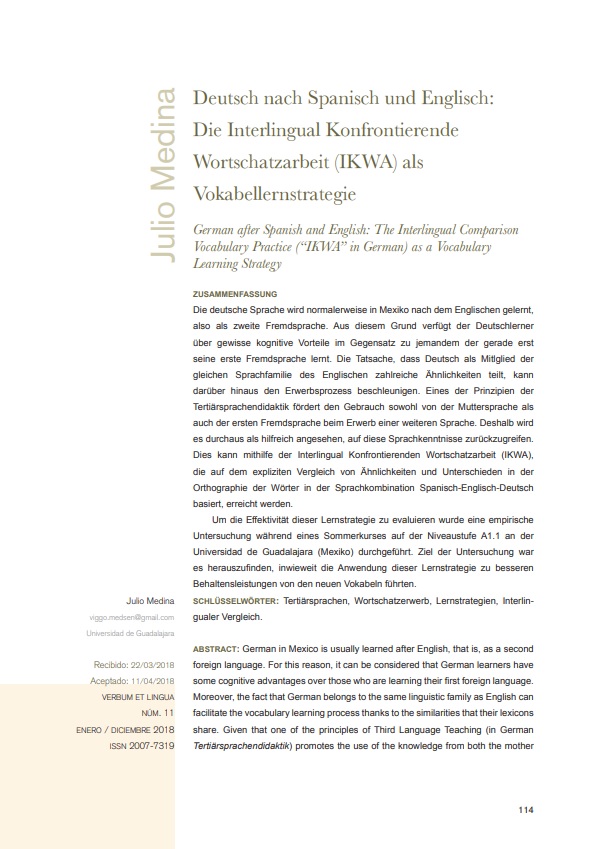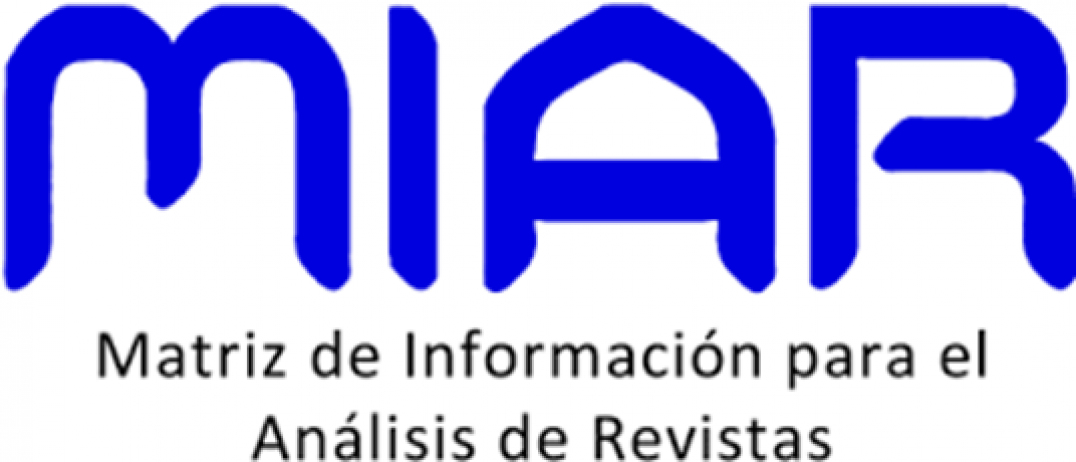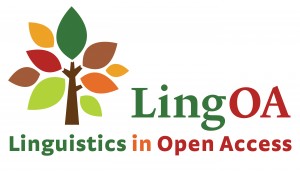German after Spanish and English: The Interlingual Comparison Vocabulary Practice (“IKWA” in German) as a Vocabulary Learning Strategy
DOI:
https://doi.org/10.32870/vel.vi11.106Keywords:
Third Language Acquisition, Vocabulary Learning, Learning Strategies, Interlingual Comparison.Abstract
German in Mexico is usually learned after English, that is, as a second foreign language. For this reason, it can be considered that German learners have some cognitive advantages over those who are learning their first foreign language. Moreover, the fact that German belongs to the same linguistic family as English can facilitate the vocabulary learning process thanks to the similarities that their lexicons share. Given that one of the principles of Third Language Teaching (in German Tertiärsprachendidaktik) promotes the use of the knowledge from both the mother tongue as well as the first foreign language to the learning of an additional language, it can seem reasonable to take advantage of such knowledge to speed up the vocabulary acquisition process. Interlingual Lexical Contrast exercises consist of the explicit comparison of both similarities as well as differences in the spelling of words in the combination: Spanish-English-German.
An empirical research of quantitative nature was carried out to evaluate the effects of this technique during a German intensive summer course at the A1.1 level at the University of Guadalajara. The aim of this research was to determine to what extent this learning technique contributed to increased memorization rates of the new words.
Downloads
Metrics
References
Aitchison, J. (2003). Words in the mind: an introduction to the mental lexicon. West Sussex: Wiley-Blackwell.
Bausch, K. R., Christ, H. & Krumm, H. J. (Hrsg.). (1995). Handbuch Fremdsprachenunterricht. Tübingen und Basel: A. Francke Verlag, 3. Auflage.
De Bot, K. (2004). The multilingual lexicon: modeling selection and control. International Journal of Multilingualism, 1, 17-32.
Dijkstra, T., Grainger, J., & Van Heuven, W. J. B. (1999). Recognition of cognates and interlingual homographs: The neglected role of phonology. Journal of Memory and Language, 41, 496–518.
Ecke, P. & Hall, C. J. (2000). Lexikalische Fehler in Deutsch als Fremdsprache. Translexikalischer Einfluss auf drei Ebenen der mentalen Repräsentation. Deutsch als Fremdpsrache – Zeitschrift zur Theorie und Praxis des Deutschunterrichts für Ausländer, 37-1, 30-36
Ecke, P. & Hall, C.J. (2003). “Parasitism as a default mechanism in acquisition of L3 Vocabulary”. In: Cenoz, J., Hufeisen, B. & Jessner U. (Hrsg.): The Multilingual Lexicon. S. 71-85. Amsterdam: Kluwer Academic Publishers.
Ecke, P. (2003). Substitutionsfehler und Wörter auf der Zunge: Evidenz für das multilinguale Lexikon. Bulletin VALSASLA (Vereinigung für angewandte Linguistik in der Schweiz) 78, 35-48.
Ecke, P. (2010). La adquisición de artículos indefinidos por estudiantes de alemán como tercera lengua. In Memorias del IX Encuentro AMPAL. Mexico Stadt.
Grosjean, F. (1997). “Processing mixed language: Issues, findings, and models”. In A. M. B. De Groot and J. F. Kroll (Hrsg.), Tutorials in bilingualism: Psycholinguistic perspectives. S. 225- 254. Mahwah: Lawrence Erlbaum
Associates.
Harden, T. (2006). Angewandte Linguistik und Fremdsprachendidaktik. Tübingen: Narr
Hufeisen, B. & Neuner, G. (Hrsg.) (2003). MehrsprachigkeitskonzeptTertiärsprachen-Deutsch nach Englisch. Strasbourg: Council of Europe Publishing
Kersten, S. (2009). „Das mentale Lexikon und Vokabellernen in der Grundschule“. In: Said Sahel & Ralf Vogel (Hg.): 10. Norddeutsches Linguistisches Kolloquium, S.66–88
Lemhöfer, K., Dijkstra, T., & Michel, M. C. (2004). Three languages, one ECHO: Cognate effects in trilingual word recognition. Language and Cognitive Processes, 19, 585–611.
Levelt, W. (1989). Speaking: From intention to articulation. Cambridge: MIT Press
Merten, S. (2011). „Wortschatzarbeit in mehrsprachigen Klassen“. In: Pohl, Inge und Ulrich, Winfried (Hrsg.): Wortschatzarbeit. S. 452-467. Baltmannsweiler: Schneider Verlag Hohengehren.
Neuner, G. (2003). Mehrsprachigkeitskonzept und Tertiärsprachendidaktik. In: Hufeisen, Britta & Neuner, Gerhard (Hrsg.):MehrsprachigkeitskonzeptTertiärsprachen-Deutsch nach Englisch. S. 13-34. Strasbourg: Council of Europe Publishing.
Neveling, C. (2004). Wörterlernen mit Wörternetzen. Eine Untersuchung zu Wörternetzen als Lernstrategie und als 130 Julio Medina. Deutsch nach Spanisch und Englisch:... Forschungsverfahren. Tübingen: Gunter Narr Verlag.
Paradis, Mi. (2004). A neurolinguistic theory of bilingualism. Amsterdam: Benjamins
Quetz, J. (1995). „Erwerb von Fremdsprachen im Erwachsenenalter“. In: Bausch, Karl-Richard/Christ, Herbert/Krumm, Hans-Jürgen (Hrsg.): Handbuch Fremdsprachenunterricht. S. 451- 456. Tübingen und Basel: A. Francke Verlag.
Roche, J. (2008). Fremdsprachenerwerb – Fremdsprachendidaktik. Tübingen: Francke Verlag
Scherfer, P. (1995). „Wortschatzübungen“. In: Bausch, Karl-Richard/Christ, Herbert/Krumm, Hans-Jürgen (Hrsg.): Handbuch Fremdsprachenunterricht. S. 229-231. Tübingen und Basel: A. FranckeVerlag,
Selimi, N. (2014). Wortschatzarbeit konkret. Baltmannsweiler: Schneider Verlag Hohengehren.
Stork, A. (2003). Vokabellernen – Eine Untersuchung zur Effizienz von Vokabellernstrategien. Tübingen: Gunter
Narr Verlag
Veldhues, A. (2010). Deutsch mit Englisch für russische Lerner/innen. Moskau: Goethe Institut. http://www.goethe.de/ins/ru/pro/lern-deutsch/produkte/deutsch_mit_englisch.pdf













